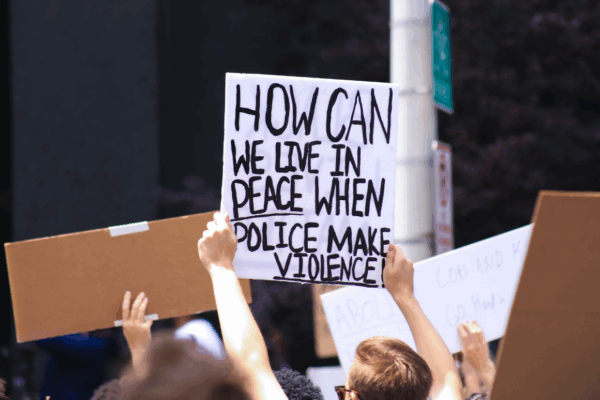The special session – which ran longer than regular sessions – is finally ending. The session was convened for two purposes:
- To make changes to the budget due to COVID-19
- To address systemic racism in our policing and criminal legal system in response to this summer’s protests.
So, was progress made? Sort of. Here’s what happened in the special session, and what still needs to get done.
Setting Statewide Standards for Police Accountability
Good news first: Many of our decertification concerns were addressed in Senate Bill 5030, introduced by Sen. Mamie Locke. SB5030 is positioned as an all-in-one reform package that addresses everything from banning no-knock warrants to limiting police use of force and more. One change strengthens and expands the circumstances that can result in a law enforcement officer losing their certificate to police. As a result of SB5030, police will immediately lose their license if they are terminated or resign in lieu of termination for engaging in serious misconduct or act in a manner that compromises their credibility, integrity or honesty in the proceedings of a criminal case. Another change creates statewide standards of conduct that all officers must follow.
We’re counting this as a win, but we need to make sure that community members and people affected by police misconduct have a say in the definition of “serious misconduct.” The law establishes a diverse oversight board as well as a working group with community, social service, legal and law enforcement representatives. A majority of the working group will notably be composed of individuals who are not employed in the criminal legal system.
Ending Qualified Immunity as a Legal Shield
Unfortunately, both House Bill 5013 (introduced by Del. Jeffrey Bourne) and its companion bill in the Senate, SB5065 (Sen. Joe Morrisey), failed. Following this legislation was a roller-coaster ride – it failed, was revived, failed again, and was revived again. Ultimately the bill passed the House 49-45 but failed in the Senate Judiciary Committee 12-3. This bill would have created a way for Virginians to sue police for the harms caused by police violence. If you’re hurt or killed by a police officer who has used excessive force in violation of the federal constitution, qualified immunity limits the likelihood that you or your family can recover money damages for the harm caused by the officer. By wasting the opportunity to remove “qualified immunity” as a defense to state lawsuits, Virginians will continue to experience real harm by police with no consequences. Virginians deserve the right to sue in Virginia courts, with Virginia judges and juries.
We are not giving up. We believe this would have been one of the most impactful reforms to deterring bad policing. So, we’re keeping it on our agenda for the upcoming General Assembly session, and we need you to stand up and let your voice be heard. Lawyers, judges and community leaders across the country have all denounced the use of qualified immunity as a defense. Follow our Lobby Guide to let your senator and delegate know that this is one of the most important issues that needs to be addressed during the General Assembly.
What Else Is on Our Radar
While we focused on decertification reform and the elimination of qualified immunity as a defense, there were several bills uplifted by our partners that we followed and supported.
- WIN: SB5017 changes the definition of what qualifies as a local correctional facility to include ICE detention centers. This gives state health inspectors access to federal immigration detention centers.
- WIN: SB5007 eliminates mandatory jury sentencing and gives defendants the option of being sentenced by a jury or a judge. This reform will help stop prosecutors from coercing defendants into taking plea deals instead of exercising their constitutional right to a jury trial.
- PARTIAL WIN: SB5029/HB5058 to change the smell of marijuana to a secondary offense has been pushed back to the Senate with recommendations from the governor. The recommendations fail to address racial profiling against Black and Brown people and allow police to pull people over and search their cars if they smell marijuana.
- WIN: SB5038, known as the Marcus Alert, creates teams of mental health service providers, crisis call center staff and peer recovery specialists to accompany police officers responding to individuals suffering a mental health crisis.
- PARTIAL WIN: SB5035 creates statewide civilian oversight boards with the power to weigh in on police policies, subpoena police officers and have disciplinary authority over police. Unfortunately, this does not apply to sheriff’s departments, which police more than 3 million Virginians.
- PARTIAL WIN: SB5034/HB5148 establishes the ability for people who are serving time in Virginia prisons to earn credit for days served. While this earned credit bill was originally written to include all people, it was gutted with a carve-out of over 100 crimes - including many drug related crimes which are disproportionately served by Black and Brown people - that would disqualify people from earning any credit.
- WIN: SB5120 set aside $2 million for the Department of Elections to pay for postage on 2020 presidential election absentee ballots and created guidelines for the establishment and operation of drop-off locations. The bill was passed and signed by the governor.
Join Our Efforts
We’re continuing our focus on qualified immunity and other systemic reforms for the upcoming General Assembly session. Plus, we’ll continue to pressure lawmakers to strengthen those bills that fell short and failed to create a more racially equitable system. You can help by adding your voice for real police reform and racial equity.
Stay encouraged. Stay committed. Stay vigilant.

